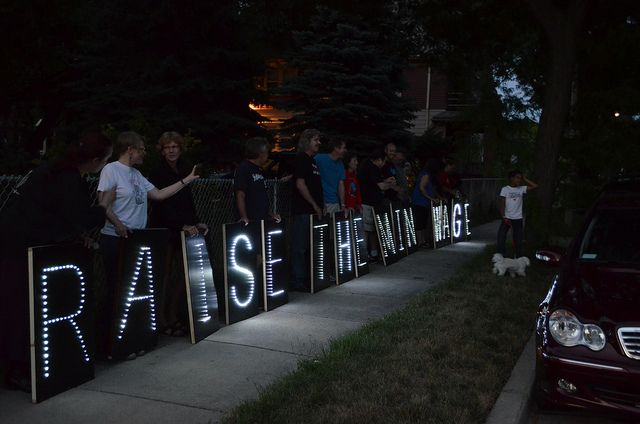Occupy Philadelphia’s choice to set up camp in front of City Hall made sense from a visibility standpoint, but not so much in terms of protesting those who have created the policies the movement fought against. Economic and political inequalities that define our times are largely a result of policy choices made at the national level, with occasional assists from state governments. Municipal governments do not govern the financial industry and don’t have much say over the labor laws that govern union organizing. (For this, you’d be better off paying attention to the fallout from this week’s general election.)
But that isn’t to say that there’s nothing municipal governments can do to address the low-wage economy that one-fourth of Americans are now laboring within. Considering the inherent biases towards deadlock on Capitol Hill, it is imperative that city governments act, where possible, on the policy issues that our chronically unproductive Congress refuses to take up. Here are six policy ideas that municipal governments can enact to mitigate economic inequality and civilize the low-income labor market.
1. Minimum Wage
The minimum wage isn’t what it used to be. In 1968, after adjusting for inflation, workers couldn’t be legally paid less than $8.54 an hour in today’s money. But today the minimum wage is only $7.25 an hour, or $14,500 a year. Even with SNAP and the earned income tax credit, caring for yourself, let alone a family, on such a meager income is a real struggle.
A new law to raise the national minimum wage will not be passed by a Congress controlled by the contemporary Republican Party, which is the most conservative in modern history. But cities have the power to raise the minimum wage without the assent of national or state governments. San Francisco’s minimum wage is currently $10.24 and will go up by more than 25 cents at the beginning of next year (it is indexed to inflation, unlike the national minimum wage). Other cities have done the same, including Santa Fe and Washington, D.C.
Conservatives routinely denounce such legislation as a job killer. Back in 1996, then-Representative Mark Souder (R-Ind.) provided a succinct version of the rote objection: “I understand it is called a minimum wage bill, but in fact it is a layoff bill,” Souder said while denouncing President Clinton’s successful attempt to raise the minimum wage. “Kids will lose their jobs, minorities will lose their jobs, senior citizens will lose their jobs… in center cities, marginal businesses will be devastated.”
There are reams of evidence that disprove such claims. Researchers have even specifically looked at the economic impact on cities with higher minimum wages than their surrounding suburbs. If conservative fears were accurate, we would expect to see economic growth stagnate and wages decline in the urban areas. This 2007 study (paywall) found that San Francisco’s policy of pegging its minimum wage to inflation successfully increased take-home pay without dragging down employment rates. Last year, the Center for Economic Policy Research looked at minimum wage increases in San Francisco, Santa Fe and Washington D.C., and compared their employment in low-wage sectors in these municipalities to those of surrounding suburbs and comparable cities. Employment levels in low-wage industries were not adversely affected in any of three cities.
2. Paid Sick Leave
Universal paid sick leave is another law that has been stalled in D.C. by intense Republican and industry opposition. Around 40 percent of America’s private sector workforce does not have access to paid sick leave, and the numbers get worse the further down the income spectrum you go. San Francisco, again, has lead the trend towards municipal paid sick leave laws, passing the first one in 2006 and requiring every employer with more than seven employees to provide the benefit. The law functions along the “earned sick leave” model, which means that for every X number of days worked, one sick day is accrued.
Although the city’s business lobbies, especially in the restaurant industry, fiercely opposed this modest policy, a few years later employers seem to have embraced the law. Kevin Westlye, executive director of the Golden Gate Restaurant Association, told BusinessWeek in 2010: “[Paid sick leave] is the best public policy for the least cost. Do you want your server coughing over your food?”
Studies of the ordinance have proven its success. Employment has not declined, and instead remained stronger than in any of the city’s surrounding counties. That remains true when researchers singled out the low-income sectors — like food service and retail — that had the most to gain (and employers feared the most to lose). One survey of 700 employers found that they “overwhelmingly report that their profits haven’t declined as a result of the law.”
But despite glowing reviews from workers and business owners alike, paid sick leave policies have proven incredibly difficult to enact in other cities. In both Philadelphia and New York City, city council majorities have approved similar laws, only to have them vetoed by the mayor and stymied by the council president, respectively. Apparently, businesses interests in other cities don’t read Business Week.
3. Anti-Wage Theft
Wage theft haunts the low-income economy. Where workers don’t have much power, employers feel free to not pay them the amount they are legally owed by minimum wage and overtime laws. Others just steal tips, demand kickbacks or don’t pay at all. The National Employment Law Center (NELP) estimated in 2008 that, on average, low-wage workers have 15 percent of their annual earnings taken from them by unscrupulous bosses.
Again, anti-wage theft policy is frozen on the national level. But various states, most notably New York, have passed strong new laws against the practice. And cities have been active as well. Last year, Philadelphia’s City Council passed a law that prevented restaurant owners from using a portion of their servers’ tips to cover credit card fees.
But the most comprehensive municipal legislation is in Miami-Dade County. There, officials recently opened an office within their Department of Small Business Development where workers can report a case of wage theft. If the county deems a claim valid, the employer is informed and, often, pays up upon being contacted by the government. If not, the case goes to an administrative hearing (which are held once a month). The burden of proof is on the employer, which makes sense: They are meant to keep documentation for all their employees anyway. If guilt is established, the uncooperative employer must pay back not only the sum they stole, but an additional two times that amount, and the administrative costs of the hearing.
The law went into partial effect in March 2010, although at that point all the county could do was receive complaints and call the employers. As of April 2012, this act alone has retrieved around half a million stolen dollars. The hearings began in 2010 and that process, again as of April 2012, has brought back a further $500,000. The costs to the county are minimal and workers are getting their money back.
4. Wage Tax Rebate
City wage taxes are relatively rate in America but not in Pennsylvania, where almost every municipality levies an Earned Income Tax on its residents and others who work within city limits. (Unearned income, such as dividends and interest, is not taxed.) This ridiculously regressive setup is particularly marked in Philadelphia, which has a flat rate of 3.98 percent, and Pittsburg, with 3 percent.
In a city like Philadelphia, where the poverty rate is over 25 percent, every extra dollar in the people’s pocket counts. Councilmember David Cohen understood this and, in one of his last acts in office, passed a wage tax rebate for the working poor in Philadelphia. Considering the fact that low-income people tend to spend whatever money they have to stay afloat in the place where they live, the benefits of the rebate would largely be felt by businesses within Philadelphia city limits.
The rebate never went into effect and after Cohen’s death in 2005, city politicians successfully attempted to subvert the law, pushing back the enactment date to 2017 and, finally, killing it entirely. Mayor Michael Nutter and his supporters in City Council say they don’t only want to eliminate the wage tax rebate, but cut the wage taxes for everyone. So far, however, they’ve only done the former.
As the Keystone Research Center argued, the wage rebate for the working poor would be better for Philadelphia than an across the board cut. Of the targeted rebate for the working poor, 84 percent would go to city residents rather than commuters, while the theoretical across-the-board cuts see commuters receiving 37 percent of the benefits.
5. Community Benefit Agreements and Project Labor Agreements
While cities cannot fix America’s broken labor laws, they can act with construction and service sector unions to ensure that the benefits of high-profile developments are widely distributed. This year, New York signed just such a law for any hotels or convention centers that are run or partially funded by state authorities. But cities can also require such agreements for specific projects, such as a convention center or airport expansion. Hartford and Washington, D.C. both have ordinances, similar to the New York law, requiring businesses that enjoy tax breaks, loans or state and federal money funneled through the city to agree to a labor peace agreement.
Casinos are another strong target for these laws. Considering the well-documented dark side of the gambling business, owners often promise good jobs and economic growth when they bring their complexes to a city. But the only way to guarantee that is if the workers are organized and have bargaining power. Otherwise, all those promises evaporate into a lot of low-paying, unevenly scheduled jobs.
Cities can also set other community benefits agreements (CBAs), which require owners to sign a legally enforceable contract to provide affordable housing, health services and living wage jobs. First-hire policies ensure that a certain percentage of the workforce is hired from within the city itself, and perhaps from particularly vulnerable populations: Returning veterans, ex-offenders or the long-term unemployed. (Portland, Ore. recently approved a new ordinance that combines PLAs and CBAs.)
6. Felony Employment Laws
According to the Department of Justice, 630,000 Americans are released from state and federal prisons every year, with around 30 percent of the country’s population sporting a “state rap sheet.” In short, a significant portion of the populace has been imprisoned. The numbers are especially high among many urban, low-income communities.
Felony employment laws, enacted in many states and cities, are meant to end employment discrimination against people who have been imprisoned while providing employers with guidelines for hiring ex-offenders. In Pennsylvania, for instance, management “may only consider a job applicant’s felony or misdemeanor convictions if they relate to the applicant’s suitability for employment.” Other policies provide tax incentives and other strategies to reduce employer’s fears of hiring ex-offenders (however unfounded those may be), including getting rid of employer liability if a background check is held.

















